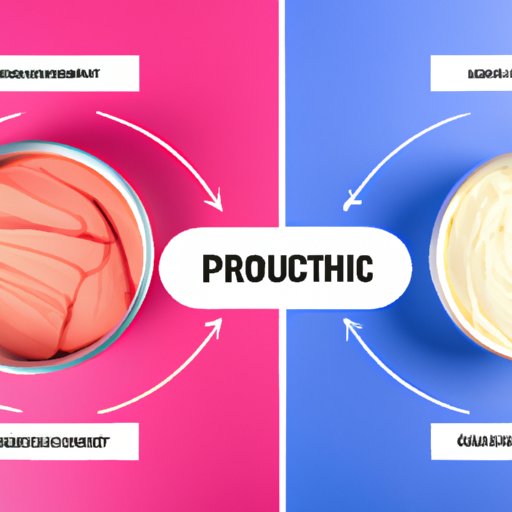
I. Introduction
Probiotics have become increasingly popular in recent years for their many supposed health benefits, from improving digestion to boosting immunity. However, as with any health trend, many myths and misconceptions have arisen about probiotics. One such myth is that probiotics can cause you to gain weight.
Understanding the relationship between probiotics and weight gain is important in order to separate fact from fiction and make informed choices about your health and wellness. In this article, we’ll explore the science behind probiotics and weight gain, dispel common myths, and provide accurate information based on scientific research.
II. The Connection Between Gut Health and Weight Gain: An Examination of Probiotics
The gut microbiome, or the community of microorganisms living in our digestive tracts, plays a crucial role in our overall health and well-being. An imbalance in the gut microbiome, known as dysbiosis, has been linked to a range of health issues, including weight gain and obesity.
Probiotics are live microorganisms that are similar to the beneficial bacteria found naturally in our guts. By adding probiotics to our diets, we can help to restore balance to the gut microbiome, potentially improving our overall health and wellness.
III. Probiotics and Weight Management: Bust the Myth that Probiotics Make You Gain Weight
Despite the supposed benefits of probiotics, many people believe that taking probiotics can actually cause you to gain weight. However, this misconception is not supported by scientific research. In fact, recent studies have found that probiotics may actually help with weight loss and weight management.
A review of 25 studies on probiotics and weight found that taking probiotics led to a modest but significant reduction in body weight and body mass index (BMI). The study authors suggest that this may be due, in part, to the ability of probiotics to reduce inflammation and improve insulin sensitivity, both of which are important factors in weight management.
IV. The Surprising Truth About Probiotics and Weight: Dispelling Common Misconceptions
In addition to the myth that probiotics can cause weight gain, there are several other common misconceptions about probiotics and weight. One myth is that all probiotics are created equal, and that any probiotic supplement will provide the same benefits. In reality, different strains of probiotics have different effects on the body, and it’s important to choose a probiotic supplement that contains the strains that are best suited to your individual needs.
Another common misconception is that probiotics can magically undo the effects of an unhealthy diet or lack of exercise. While probiotics can certainly help to support a healthy gut microbiome, they cannot replace a healthy lifestyle. The best results are typically achieved by incorporating probiotics into a larger program of healthy eating, physical activity, stress management, and other self-care practices.
V. How Probiotics Affect Your Weight: Separating Fact from Fiction
So how exactly do probiotics affect weight and metabolism? There are several possible mechanisms at play. One is the ability of certain probiotics to reduce inflammation in the body. Chronic inflammation is associated with a range of health problems, including insulin resistance, which can lead to weight gain and obesity. By reducing inflammation, probiotics may help to improve insulin sensitivity and promote weight loss.
Another mechanism by which probiotics may affect weight is by altering the way that the body stores and processes fat. Studies have found that certain strains of probiotics can increase the production of short-chain fatty acids, which are linked to a range of health benefits, including improved metabolism and reduced inflammation.

VI. Investigating the Link Between Probiotics and Weight: What Science Tells Us
While the research on probiotics and weight is still evolving, there have been several promising studies in recent years. One study found that a specific strain of probiotic called Lactobacillus rhamnosus GG was associated with reduced body weight and fat mass in overweight individuals.
Another study found that a probiotic supplement containing a strain of bacteria called Akkermansia muciniphila led to significant weight loss in overweight people over the course of 6 weeks. Additionally, the supplement was associated with improvements in insulin sensitivity and cholesterol levels.
VII. The Role of Probiotics in Maintaining Healthy Weight and Gut Health
So what does all of this mean for your health and wellness? While probiotics are not a magic solution for weight management, they can certainly play a role in maintaining a healthy weight and gut microbiome. By improving gut health, probiotics may help to reduce inflammation, improve insulin sensitivity, and regulate appetite, all of which are important factors in weight management.
To incorporate probiotics into your diet and daily routine, consider eating fermented foods like yogurt, kefir, and sauerkraut, which are natural sources of probiotics. You can also take a probiotic supplement, though it’s important to choose a supplement that contains the strains of probiotics that are best suited to your individual needs.
VIII. Probiotics and the Battle of the Bulge: Understanding the Latest Research
As with any area of health research, the science of probiotics and weight is still evolving. However, there is a growing body of evidence to suggest that probiotics can play a role in weight management and overall health. Ongoing research is continuing to explore the complex relationship between probiotics, the gut microbiome, and our health, and we can expect to see more exciting findings in the years to come.
IX. Conclusion
Gut health is a crucial factor in overall health and wellness, and probiotics can play an important role in maintaining a healthy gut microbiome. While the myth that probiotics can cause weight gain has been debunked by scientific research, it’s important to choose the right strains and dosages of probiotics in order to achieve optimal results. By incorporating probiotics into a larger program of healthy eating, exercise, and self-care, you can support your gut health and promote overall wellness.





